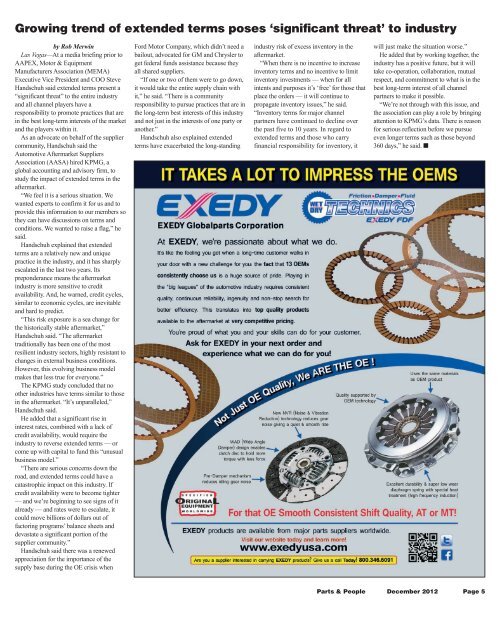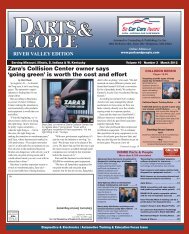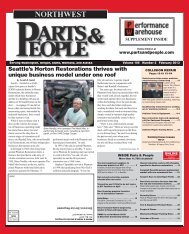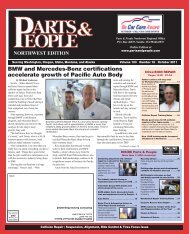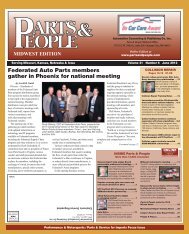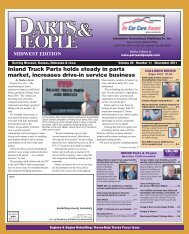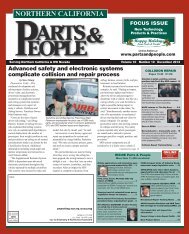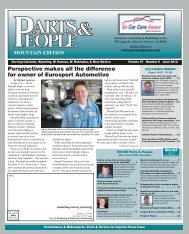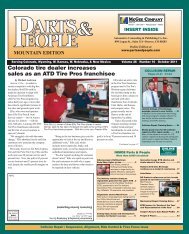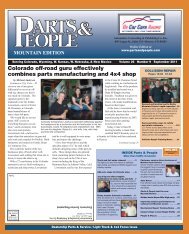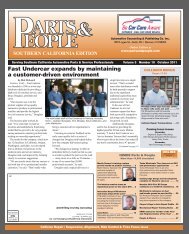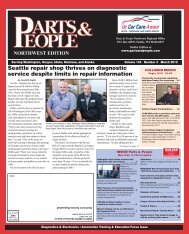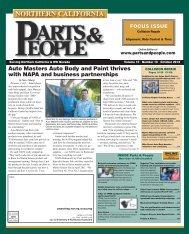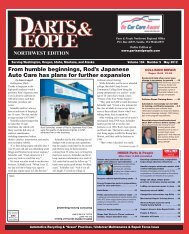North Hollywood Auto Repair benefits from location ... - Parts & People
North Hollywood Auto Repair benefits from location ... - Parts & People
North Hollywood Auto Repair benefits from location ... - Parts & People
Create successful ePaper yourself
Turn your PDF publications into a flip-book with our unique Google optimized e-Paper software.
Growing trend of extended terms poses ‘significant threat’ to industry<br />
by Rob Merwin<br />
Las Vegas—At a media briefing prior to<br />
AAPEX, Motor & Equipment<br />
Manufacturers Association (MEMA)<br />
Executive Vice President and COO Steve<br />
Handschuh said extended terms present a<br />
“significant threat” to the entire industry<br />
and all channel players have a<br />
responsibility to promote practices that are<br />
in the best long-term interests of the market<br />
and the players within it.<br />
As an advocate on behalf of the supplier<br />
community, Handschuh said the<br />
<strong>Auto</strong>motive Aftermarket Suppliers<br />
Association (AASA) hired KPMG, a<br />
global accounting and advisory firm, to<br />
study the impact of extended terms in the<br />
aftermarket.<br />
“We feel it is a serious situation. We<br />
wanted experts to confirm it for us and to<br />
provide this information to our members so<br />
they can have discussions on terms and<br />
conditions. We wanted to raise a flag,” he<br />
said.<br />
Handschuh explained that extended<br />
terms are a relatively new and unique<br />
practice in the industry, and it has sharply<br />
escalated in the last two years. Its<br />
preponderance means the aftermarket<br />
industry is more sensitive to credit<br />
availability. And, he warned, credit cycles,<br />
similar to economic cycles, are inevitable<br />
and hard to predict.<br />
“This risk exposure is a sea change for<br />
the historically stable aftermarket,”<br />
Handschuh said. “The aftermarket<br />
traditionally has been one of the most<br />
resilient industry sectors, highly resistant to<br />
changes in external business conditions.<br />
However, this evolving business model<br />
makes that less true for everyone.”<br />
The KPMG study concluded that no<br />
other industries have terms similar to those<br />
in the aftermarket. “It’s unparalleled,”<br />
Handschuh said.<br />
He added that a significant rise in<br />
interest rates, combined with a lack of<br />
credit availability, would require the<br />
industry to reverse extended terms — or<br />
come up with capital to fund this “unusual<br />
business model.”<br />
“There are serious concerns down the<br />
road, and extended terms could have a<br />
catastrophic impact on this industry. If<br />
credit availability were to become tighter<br />
— and we’re beginning to see signs of it<br />
already — and rates were to escalate, it<br />
could move billions of dollars out of<br />
factoring programs’ balance sheets and<br />
devastate a significant portion of the<br />
supplier community.”<br />
Handschuh said there was a renewed<br />
appreciation for the importance of the<br />
supply base during the OE crisis when<br />
Ford Motor Company, which didn’t need a<br />
bailout, advocated for GM and Chrysler to<br />
get federal funds assistance because they<br />
all shared suppliers.<br />
“If one or two of them were to go down,<br />
it would take the entire supply chain with<br />
it,” he said. “There is a community<br />
responsibility to pursue practices that are in<br />
the long-term best interests of this industry<br />
and not just in the interests of one party or<br />
another.”<br />
Handschuh also explained extended<br />
terms have exacerbated the long-standing<br />
industry risk of excess inventory in the<br />
aftermarket.<br />
“When there is no incentive to increase<br />
inventory terms and no incentive to limit<br />
inventory investments — when for all<br />
intents and purposes it’s ‘free’ for those that<br />
place the orders — it will continue to<br />
propagate inventory issues,” he said.<br />
“Inventory terms for major channel<br />
partners have continued to decline over<br />
the past five to 10 years. In regard to<br />
extended terms and those who carry<br />
financial responsibility for inventory, it<br />
will just make the situation worse.”<br />
He added that by working together, the<br />
industry has a positive future, but it will<br />
take co-operation, collaboration, mutual<br />
respect, and commitment to what is in the<br />
best long-term interest of all channel<br />
partners to make it possible.<br />
“We’re not through with this issue, and<br />
the association can play a role by bringing<br />
attention to KPMG’s data. There is reason<br />
for serious reflection before we pursue<br />
even longer terms such as those beyond<br />
360 days,” he said. n<br />
<strong>Parts</strong> & <strong>People</strong> December 2012 Page 5


